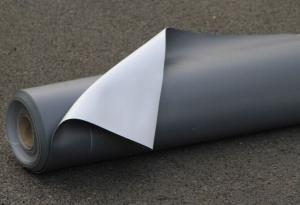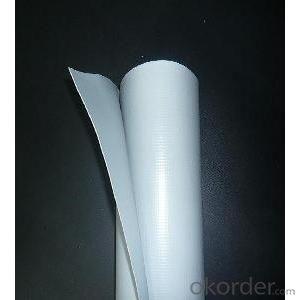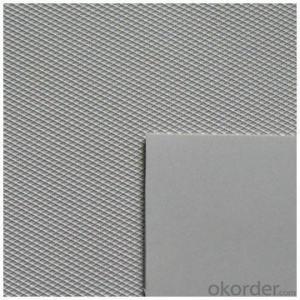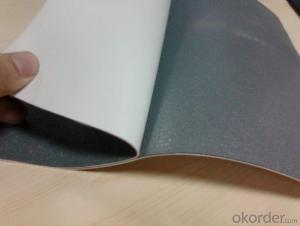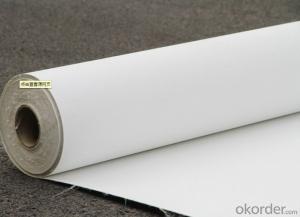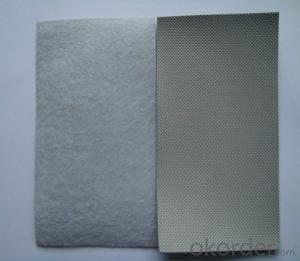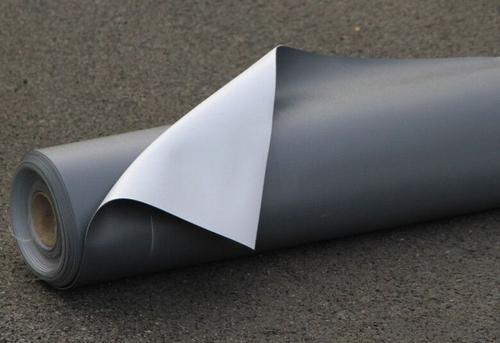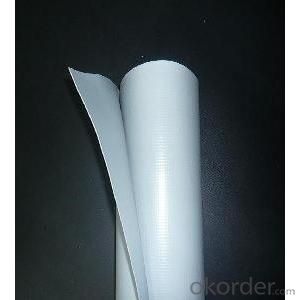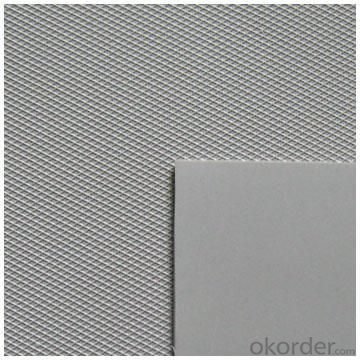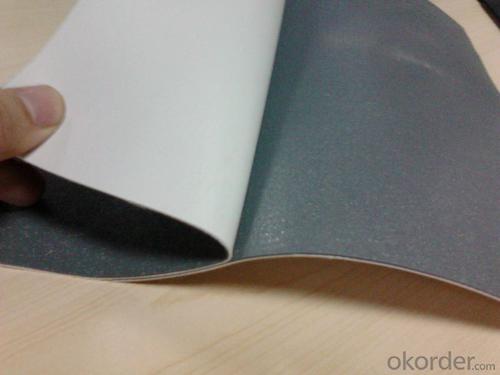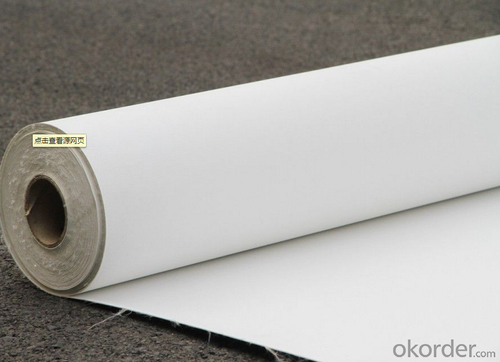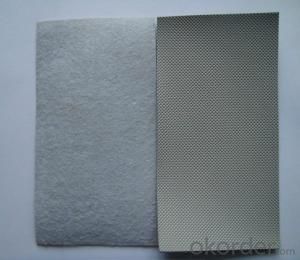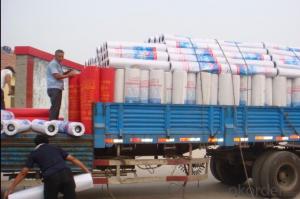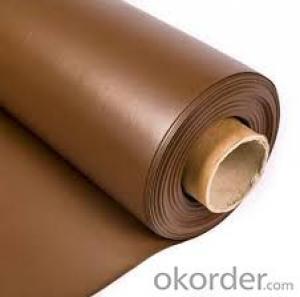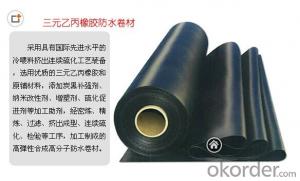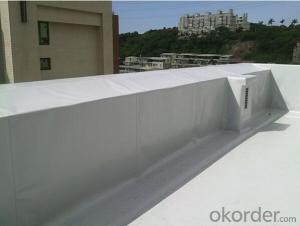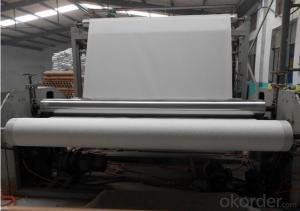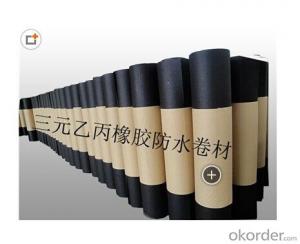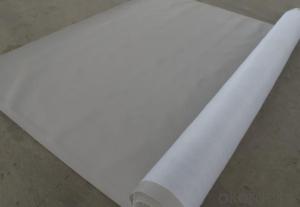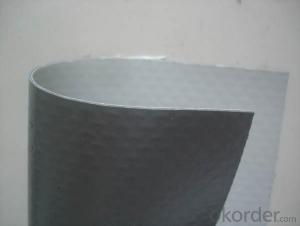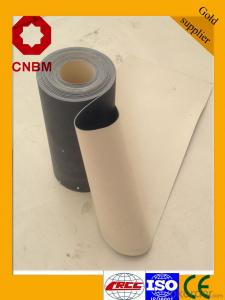PVC Waterproofing Membrane for Planting Roofing
- Loading Port:
- Shanghai
- Payment Terms:
- TT OR LC
- Min Order Qty:
- 20000 m²
- Supply Capability:
- 5000000 m²/month
OKorder Service Pledge
OKorder Financial Service
You Might Also Like
PVC Waterproofing Membrane for Planting Roofing
Product Description of PVC Waterproofing Membrane for Planting Roofing:
PVC waterproofing membrane is an excellent high-quality polymer waterproof sheet, made of PVC resin by adding plasticizer, anti-UV agent, anti aging agent, and stabilizer and other processing aids through extrusion and molding. As the highly recommended product by the Ministry of Construction, it is featured by high tensile strength, great elongation, good stability, small shrinkage, low-temperature performances, good resistance to weathering and root
penetration, and long service life.
Features of PVC Waterproofing Membrane for Planting Roofing:
1.Long service life and weathering resistance; and the materials can be used for 30 years on the roof and 50 years underground.
2. High tensile strength, great elongation, and small size change during heat treatment.
3. Good low temperature flexibility and adaptability to environmental temperature changes.
4. Good resistance to root penetration. It can be made for green roofs.
5. Excellent resistance to puncture and impact.
6. Convenient for construction (can be welded), solid and reliable, and Eco-friendly.
7. Strong resistance to chemical corrosion, suitable for special occasions.
8. Good plasticity, convenient and quick corner detail treatment. Easy maintenance and low cost.
9.After 2,000 hours of manual weathering verification
Classification of PVC Waterproofing Membrane for Planting Roofing:
1. N: Homogeneous PVC membrane
2. L: PVC membrane with fabric backing
3. W: Reinforced PVC membrane
Advantage of PVC Waterproofing Membrane for Planting Roofing:
1.) Mixing automation. Apply automatic temperature control automatic time control and automatic feed control.
2.) Extrusion equipment uses twin screw coextrusion. Screw temperature uses computer automatic temperature control system.
3.) Handpiece uses large width didhead extrusion equipment.
4.) Sophisticated three-roller calender equipment. The space between equiment is controlled by automation system.
Technical Data of PVC Waterproofing Membrane for Planting Roofing:
No. | Item | Model Ⅱ | |
1 | Tensile Strength Mpa ≥ | 12.0 | |
2 | Elongation at break% ≥ | 250 | |
3 | Shrinkage rate % ≤ | 2.0 | |
4 | Flexibility at low temperature | No crackle at -25oC | |
5 | Water tightness | Watertight | |
6 | Puncture resistance | Watertight | |
7 | Heat aging treatment | Appearance | Free from bubble, crack, cohesion and void |
Change rate of tensile strength % | +20oC | ||
Change rate of elongation at break | |||
Flexibility at low temperature | No crack at -20oC | ||
8 | Chemical corrosion resistance | Change rate of tensile strength % | +20 |
Change rate of elongation at break | |||
Flexibility at low temperature | No crack at -20oC | ||
9 | Artificial weathering | Change rate of tensile strength % | +20 |
Change rate of elongation at break | |||
Flexibility at low temperature | No crack at -20oC | ||
Application of PVC Waterproofing Membrane for Planting Roofing:
1) All kinds of roofs, such as steel structure roof, planted roof etc.
2) Underground engineering, such as building basement, subways, tunnels, air raid shelter, etc.
3) Other projects like artificial lake, dam, water reservoir, grain storehouse, etc.
Images of PVC Waterproofing Membrane for Planting Roofing:
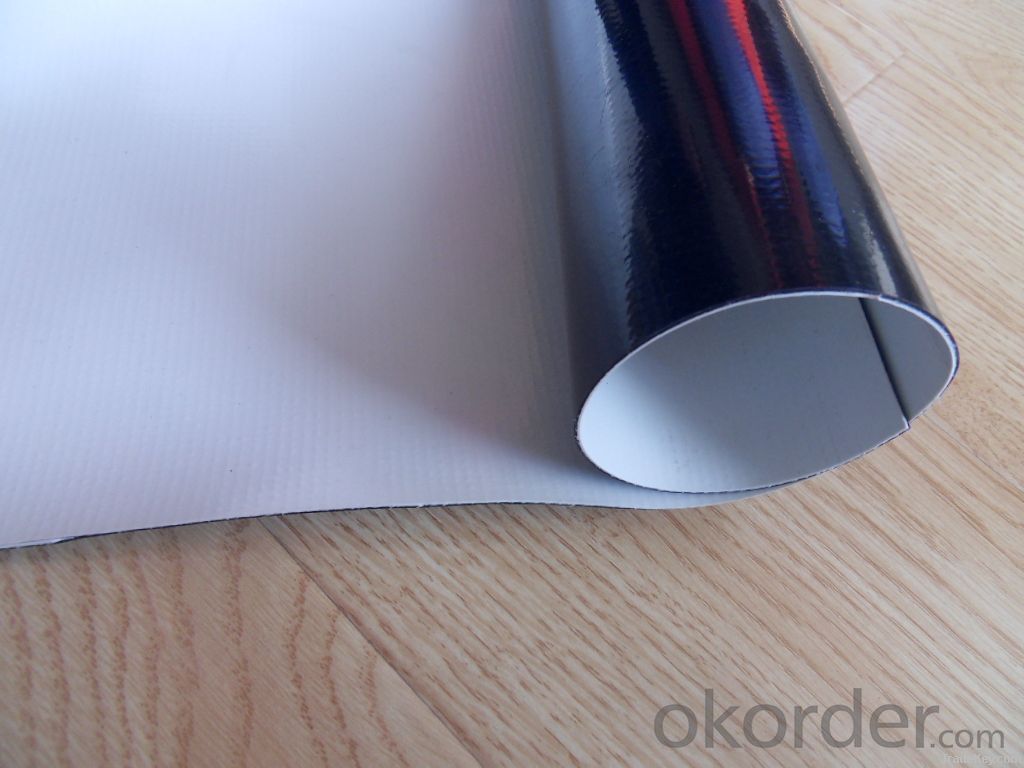
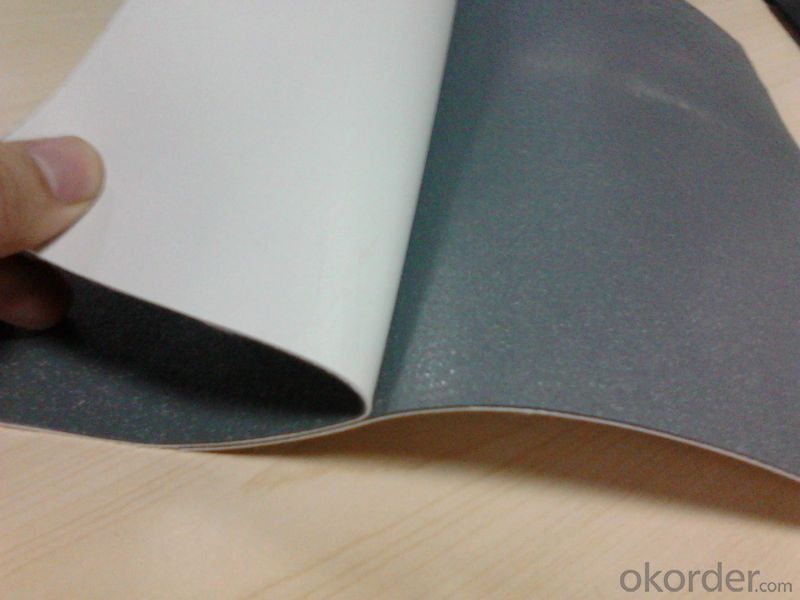
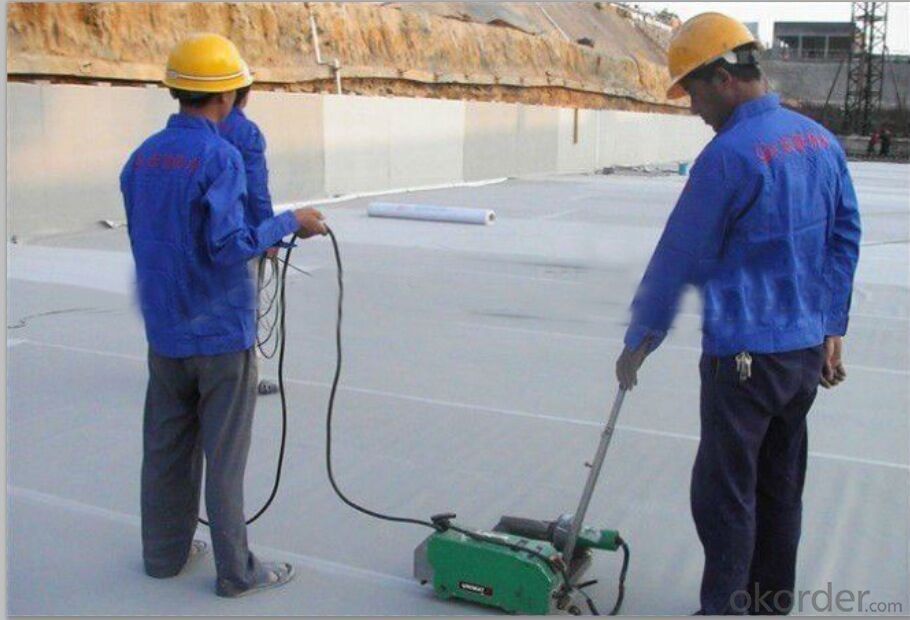
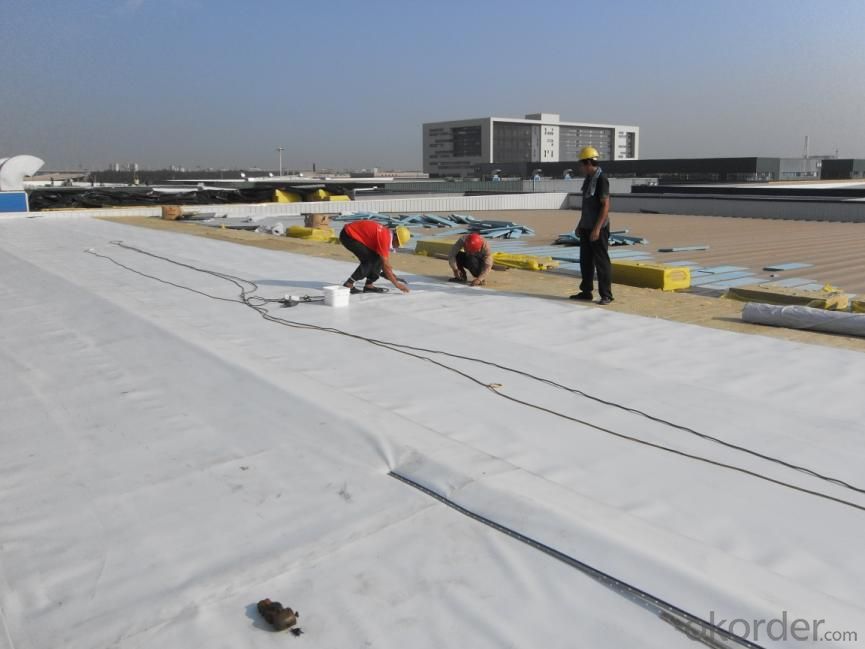
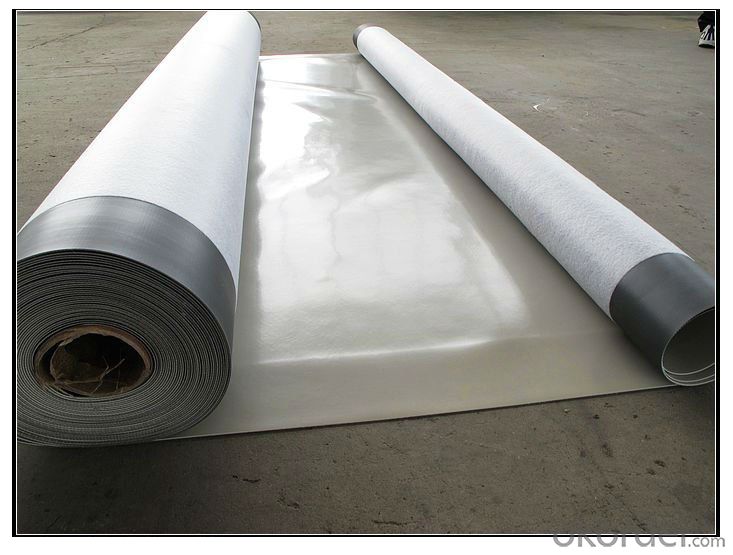
FAQ of PVC Waterproofing Membrane for Planting Roofing:
1. Can you produce 4m width?
Yes, no problem for us. We have four bases in China, largest one in this field.
2. How many quantity in one 20'' container for 1.2mm and 1.5mm?
480rolls, 11520m2 for 1.2mm and 400rolls, 9600m2 for 1.5mm
3. Can you provide free samples?
Yes, our samples are free, but express fees usually on buyer's account.
- Q: Are there any specific requirements for installing a waterproofing membrane?
- Yes, there are specific requirements for installing a waterproofing membrane. Some key requirements include ensuring a clean and dry surface, proper preparation of the substrate, correct application of the membrane according to manufacturer's instructions, and adequate curing time. Additionally, ensuring proper seam and joint treatments, as well as sufficient overlap and termination details, are essential for an effective waterproofing installation. It is crucial to follow the specific guidelines and recommendations provided by the manufacturer to ensure a successful and long-lasting waterproofing system.
- Q: Can a waterproofing membrane be used for hotels or resorts?
- Yes, a waterproofing membrane can be used for hotels or resorts. Waterproofing membranes are commonly used in the construction industry to prevent water infiltration and protect structures from moisture damage. In the case of hotels or resorts, where water exposure is frequent due to swimming pools, bathrooms, or spa facilities, using a waterproofing membrane can be an effective solution to ensure the longevity and durability of the building. It helps prevent water leaks, mold growth, and structural deterioration, thereby maintaining a safe and pleasant environment for guests.
- Q: Can a waterproofing membrane be installed on any surface?
- No, a waterproofing membrane cannot be installed on any surface. It requires a suitable and prepared surface that is clean, dry, and structurally sound for proper installation and effectiveness.
- Q: Can a waterproofing membrane be used in elevator pits?
- Yes, a waterproofing membrane can be used in elevator pits. Elevator pits are prone to water intrusion, as they are located underground and can be exposed to groundwater or other sources of moisture. A waterproofing membrane is a protective layer that is applied to the walls and floor of the elevator pit to prevent water from seeping through. It acts as a barrier and prevents water damage to the structural components of the elevator system, such as the electrical equipment, pumps, and hydraulic systems. By using a waterproofing membrane in elevator pits, the risk of water damage and corrosion can be significantly reduced, ensuring the safe and efficient operation of the elevator.
- Q: Can a waterproofing membrane be used on precast copper surfaces?
- Precast copper surfaces can indeed utilize a waterproofing membrane. These membranes possess adaptability and can be utilized across a diverse range of surfaces, including copper. Their primary purpose is to establish a protective barrier that hinders water infiltration and safeguards the underlying structure from moisture-induced harm. With accurate application, a waterproofing membrane can proficiently seal precast copper surfaces, securing enduring defense against water intrusion. Nevertheless, it is vital to verify the compatibility of the membrane with copper and conduct thorough surface preparation to guarantee optimal adhesion and performance.
- Q: Can a waterproofing membrane be used for elevator pits and sump pits?
- Elevator pits and sump pits, commonly prone to water leakage and moisture problems, can benefit from the use of a waterproofing membrane. These membranes are designed to resist water penetration and create a barrier against water intrusion, effectively sealing the pits. Materials such as rubberized asphalt, EPDM, or PVC are typically used to construct these membranes, which are then applied to the walls and floors of the pits. The installation of a waterproofing membrane provides protection to the elevator and sump pits, safeguarding them against water damage, including corrosion, mold growth, and structural deterioration. This not only ensures the functionality and durability of the pits but also creates a safe and healthy environment for occupants and equipment. Nevertheless, it is essential to consider the specific requirements and regulations of elevator and sump pit installations, as different jurisdictions may have their own codes and standards that must be adhered to. Furthermore, proper installation and regular maintenance of the waterproofing membrane are crucial to guarantee its effectiveness in preventing water infiltration.
- Q: Can waterproofing membranes be used on plant rooms?
- Yes, waterproofing membranes can be used on plant rooms. Waterproofing membranes are often used in areas where water resistance is necessary, such as basements, roofs, and plant rooms. Plant rooms typically house various mechanical and electrical equipment, and using waterproofing membranes can help protect these sensitive components from water damage.
- Q: Pvc waterproof membrane of the scope of application
- 6, light color of the surface reflection of ultraviolet radiation, the surface of the membrane to absorb less heat, low temperature; 7, long life (roof 25 years, more than 50 years underground), and no environmental pollution; 8, the details of processing is very convenient, easy maintenance, low cost.
- Q: Can waterproofing membranes be used on concrete surfaces?
- Yes, waterproofing membranes can be used on concrete surfaces. Waterproofing membranes are designed to create a barrier against water penetration, and they are commonly used on concrete surfaces to protect them from water damage. These membranes are typically made of materials such as rubber, PVC, or bitumen, and they are applied to the concrete surface in a liquid or sheet form. Once applied, the membrane forms a continuous and durable waterproof layer that prevents water from seeping into the concrete. This is particularly beneficial in areas that are prone to water exposure, such as basements, bathrooms, or exterior concrete structures. Waterproofing membranes can effectively extend the lifespan of concrete surfaces by preventing water-related issues such as cracking, spalling, or mold growth.
- Q: Can a waterproofing membrane be used for planter boxes?
- Yes, a waterproofing membrane can be used for planter boxes. A waterproofing membrane is designed to prevent water from seeping through surfaces and can be an effective solution for preventing water damage to the planter box and its surroundings. By installing a waterproofing membrane on the inside of the planter box, it creates a barrier that keeps water from reaching the underlying materials, such as wood or concrete, and helps to extend the lifespan of the planter box. Additionally, a waterproofing membrane can also help to retain moisture within the planter box, which can be beneficial for the plants growing inside. However, it is important to select a waterproofing membrane that is specifically designed for planter boxes and is safe for use with plants to ensure the best results.
Send your message to us
PVC Waterproofing Membrane for Planting Roofing
- Loading Port:
- Shanghai
- Payment Terms:
- TT OR LC
- Min Order Qty:
- 20000 m²
- Supply Capability:
- 5000000 m²/month
OKorder Service Pledge
OKorder Financial Service
Similar products
Hot products
Hot Searches
Related keywords
